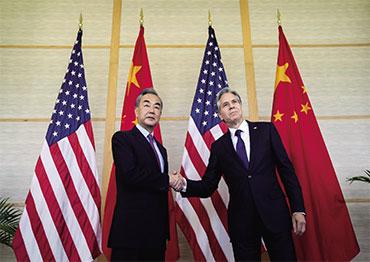hinese State Councillor and Foreign Minister Wang Yi met with US Secretary of State Antony Blinken on July 9, the day after the Group of 20 (G20) Foreign Ministers’ meeting in Bali, Indonesia.
Focusing on the Sino-US relationship, the bilateral discussion was “substantive, constructive and candid” and “helpful for enhancing mutual understanding, reducing misunderstanding and miscalculation and paving the way for future high-level exchanges between the two countries,” the Xinhua News Agency reported.
Wang told Blinken that the historical narrative of China-US relations has been distorted, the reality has been kidnapped by “political correctness,” and the development direction is in danger of being further led astray. The fundamental reason he believes is that there is a problem with the US’s perception of China, and its China policy based on such perception has naturally deviated from the right track.
“This has led many to believe that the United States is suffering from a growing ‘Chinaphobia,’ and if this ‘threat inflation’ is left unchecked, the US policy towards China will face a dead end,” Wang said.
Wang noted that the fundamental guidance for lifting Sino-US relations out of the mire is to earnestly implement the consensus reached by the two heads of State. Based on this, China puts forward four lists to the US and hopes that the US side will take it seriously. The four lists include the List of US Wrongdoings that Must Stop, the List of Key Individual Cases that China Has Concerns with, the List of Key China-related Legal Cases that China Has Concerns with, and the List of China-US Cooperation in Eight Areas.
Wang responded to the US call for guardrails for the Sino-US relationship that the three Sino-US joint communiqués are the most reliable guardrails. According to a briefing on the website of Ministry of Foreign Affairs of China, he urged the US not to send any wrong signal to “Taiwan independence” forces, and he refuted the US’s erroneous views on Xinjiang, Hong Kong and maritime issues, among others.
Blinken, according to the Chinese Foreign Ministry, outlined the US’s policy toward China, stating that the US does not seek to engage in a new Cold War with China, change China’s system, challenge the status of the Communist Party of China or block China, and it does not support Taiwan independence or seek to change the status quo across the Taiwan Strait.
According to American media, Blinken raised concerns about “Beijing’s alignment with Russia.” The Chinese Foreign Ministry said both sides discussed the Ukraine issue, but did not give any details.
It added that both sides have reached agreement on working for more outcomes of the Sino-US joint working group consultation and will set up more cooperation.

 Old Version
Old Version